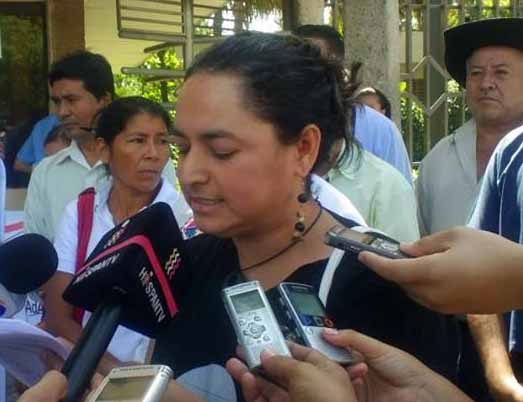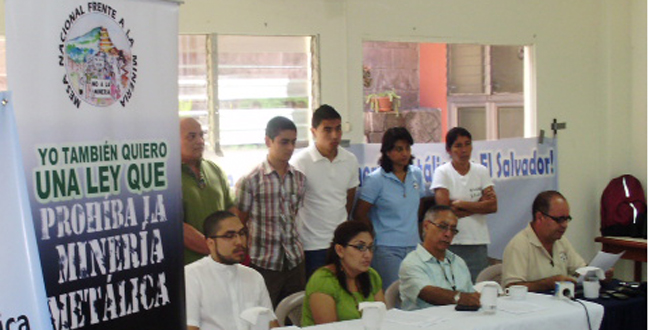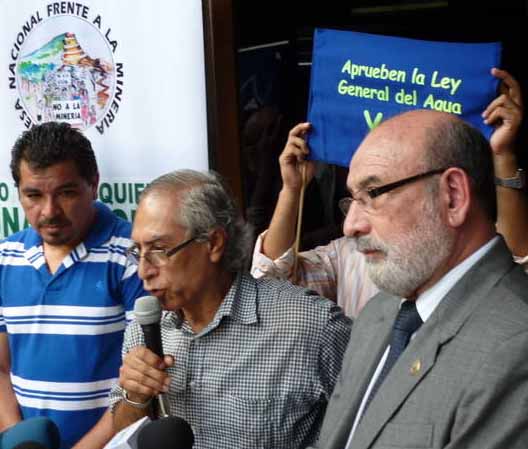- Details
-
Category: Media Releases
-
Published: Tuesday, 09 July 2013 08:49
 The National Roundtable Against Metallic Mining submitted a letter to the Constitutional Chamber of the Supreme Court of El Salvador to ask that the Free Trade Agreement with US, Central America and the Dominican Republic CAFTA-DR be declared unconstitutional.
The National Roundtable Against Metallic Mining submitted a letter to the Constitutional Chamber of the Supreme Court of El Salvador to ask that the Free Trade Agreement with US, Central America and the Dominican Republic CAFTA-DR be declared unconstitutional.
In the letter, the National Roundtable Against Metallic Mining asked the members of the chamber to rule on three pending constitutional challenges that have been submitted since 2006. These constitutional challenges were accepted by the Supreme Court as they were considered to have valid constitutional arguments against the principles of "National Treatment" and "indirect expropriation" which require the state to give foreign firms the same benefits given to Salvadoran firms and defines any governmental action or inaction that harms potential investment earnings as an injury that allows foreign firms to sue El Salvador under international trade tribunals bypassing national justice mechanisms.
The constitutional challenge to CAFTA-DR cited by members of La Mesa was filed in January 2005 and was accepted by the Constitutional Court in March 2007, along with other challenges presented. At that time, the highest court of justice in the country considered valid fourteen of the thirty arguments outlined in the demands raised by the petitioners and it established a short timeline for the Executive and the Legislative Assembly to respond to these. Six years have passed and the Chamber has failed to rule on the matter.
According to the letter presented by La Mesa today, the recent ratification of the Association Agreement (ADA) with the European Union would be adding insult to injury as this treaty contains similar clauses that allow for the violations of constitutional rights as CAFTA-DR does. In that regards, memebrs of La Mesa also requested the chamber to expedite the process of analysis, discussion and deliberation of the various arguments accepted as valid to declare the unconstitutionality of CAFTA-DR and asked that a resolution be issued in a timely manner.
The importance of issuing a decision is highlighted by members of La Mesa because it would close the door to more lawsuits from foreign corporations such as US based Commerce Group which is suing El Salvador for US$100 million; and Canada based Pacific Rim which claimed a payment of $315 million alleging violations under CAFTA-DR and now is suing the country under local investment laws.
- Details
-
Category: Mining and Human Rights
-
Published: Tuesday, 09 July 2013 06:08
Press release - July 02, 201 3
3
The National Roundtable Against Metallic Mining is an alliance of social, religious, NGOs, environmentalists, and community organizations. Since 2006, we have opposed metallic mining operation in El Salvador. Throughout these years various expressions of violence and abuses against people who make up our coalition have been committed without proper investigations and successful prosecutions of its perpetrators. In the archives of the Attorney General's Office and National Civil Police complaints of murder, death threats, persecution, kidnappings and robberies against colleagues who are part of our organization lie stagnant. Seven years into the struggle to oppose mining in the country, these threats continue to escalate.
Read more ...
- Details
-
Category: Mining and Human Rights
-
Published: Monday, 10 June 2013 11:43
ACAN EFE News Agency, El Salvador
The Archbishop of San Salvador, José Luis Escobar, suggested Sunday that the government should go to international organizations if the threat from a gold mine in Guatemala that could contaminate water in El Salvador is not resolved bilaterally.
SAN SALVADOR - The Catholic leader said in his Sunday press conference El Salvador "would have to go to international justice mechanisms" if the government can not prevent a mine which may cause damage in El Salvador.
Salvadoran environmental organizations have complained that the Cerro Blanco mine, located in Jutiapa, Guatemala, could contaminate the lake Güija and Lempa River, the largest river in this country.
The mine, owned by Canadian mining corporation GoldCorp Inc. is still on its exploration phase.
Escobar made a "call" to the government and Salvadoran members of the legislature to "have this resolved", although he acknowledged that the government “is taking action" on the case.
If it is argued that "it cannot be resolved" because "it is a problem of Guatemala", the fact is "that it affects us because we drink this water," said the Archbishop of San Salvador.
"It is not possible that economic benefits trump the health of an entire nation, never mind the death it will cause… It is not possible that in this XXI century we are caught in a legal and social entanglement that cannot be afforded" he insisted.
The foreign ministers of El Salvador Hugo Martinez and Fernando Carrera of Guatemala have been in dialogue about the case of the mine, according to a statement last February by the Salvadoran official.
Escobar said the Salvadoran Catholic Church supports the issuance of new water and mining laws, pending in the Legislature for several months.
The church is "in favor of defending the argument of saying no mining exploitation" and hopes that a new law "will protect natural resources" of El Salvador, he added.
"It is not right with these resources are taken away and (...) while the cyanide, and a poisoned a nation are left behind" added the archbishop.
El Salvador has suspended mining projects by government decision, but environmental organizations and other sectors demand mining to be banned permanently by law.
Translated from
http://www.prensalibre.com/noticias/politica/Arzobispo-salvadoreno-denuncia-internacional-Guatemala_0_934706683.html
- Details
-
Category: Mining and Human Rights
-
Published: Thursday, 06 June 2013 04:38
Thousands of people hailing from different regions of El Salvador marched through San Salvador this morning to urge the government to stop metallic mining and to approve legislation to protect water in the country.
The Ecological Walk w as organized by a coalition of environmental and religious organizations in commemoration of World Environment Day, WED - designated by the United Nations Environment Programme in 1973 to promote awareness on the importance of preserving our biodiversity and to find ways to take corrective action on issues related to climate change, environmental degradation and sustainability. WED’s theme this year focused on reducing the amount of food is wasted around the globe.
as organized by a coalition of environmental and religious organizations in commemoration of World Environment Day, WED - designated by the United Nations Environment Programme in 1973 to promote awareness on the importance of preserving our biodiversity and to find ways to take corrective action on issues related to climate change, environmental degradation and sustainability. WED’s theme this year focused on reducing the amount of food is wasted around the globe.
Read more ...
- Details
-
Category: Media Releases
-
Published: Wednesday, 05 June 2013 06:07
Public Private Partnerships open the possibility of mining in El Salvador
We are concerned that the PPP law opens the door for approval of mining projects in the northern region of the country. Our concerns are particularly fueled by the fact that approval for legislation to prohibit Metal Mining and the General Water Law, aimed at reversing environmental vulnerability and water scarcity, is still pending in parliament.
We believe that PPPs deepen neoliberal policies of privatization of public services that affect the economic, social and cultural rights of the Salvadoran population. We ask the Legislature that instead of enforcing programs proposed by the International Monetary Fund, they should approve laws that foster environmental sustainability such as the water protection laws, the prohibition of metal mining, and the ratification of Article 69 of the Constitution which establishes the right to water and food for all Salvadorans.
Read more ...
- Details
-
Category: Background and reports
-
Published: Friday, 24 May 2013 11:45
“Gold Mining and the Defense of Water in El Salvador”
International Delegation to El Salvador, May 10-13, 2013
Preliminary Report
May 22, 2013
From May 10-13 2013, an international delegation from 12 countries representing 22 human rights, social justice and environmental non-profit organizations and advocates, along with academics, journalists, artists and grassroots activists, carried out a three day tour of El Salvador to examine experiences with gold mining operations and the defense of water.
Read more ...
 The National Roundtable Against Metallic Mining submitted a letter to the Constitutional Chamber of the Supreme Court of El Salvador to ask that the Free Trade Agreement with US, Central America and the Dominican Republic CAFTA-DR be declared unconstitutional.
The National Roundtable Against Metallic Mining submitted a letter to the Constitutional Chamber of the Supreme Court of El Salvador to ask that the Free Trade Agreement with US, Central America and the Dominican Republic CAFTA-DR be declared unconstitutional.
 3
3 as organized by a coalition of environmental and religious organizations in commemoration of
as organized by a coalition of environmental and religious organizations in commemoration of